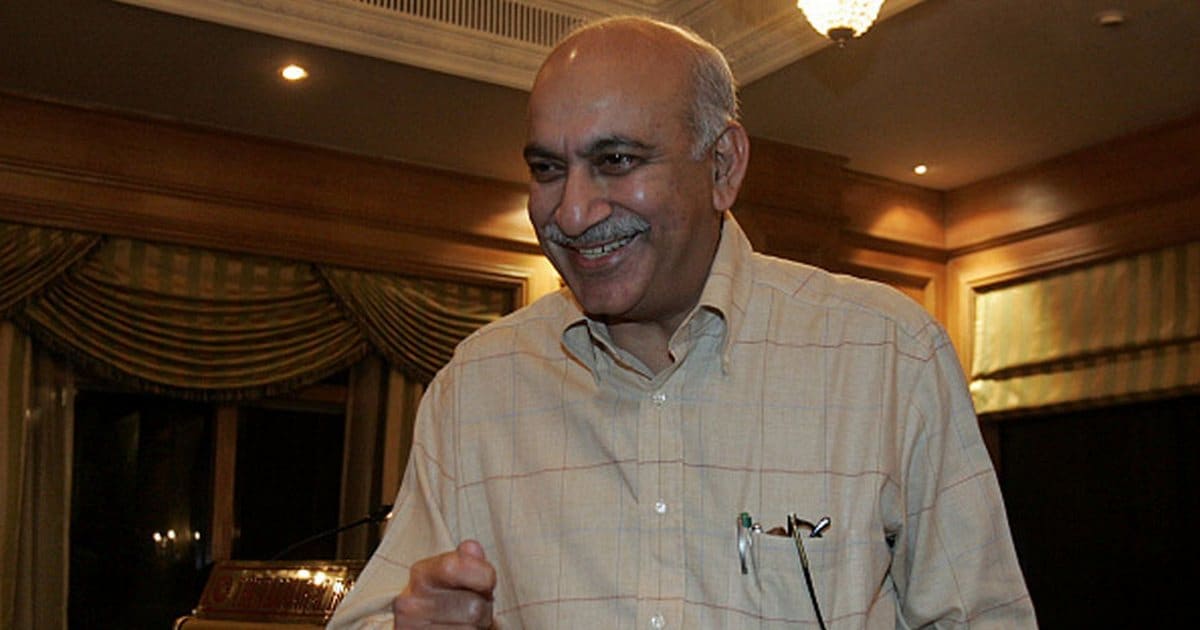
[ad_1]
After a host of allegations of ‘sexual misconduct’ levelled against him, now an allegation of ‘rape’ has surfaced against former minister of state for foreign affairs MJ Akbar.
In an article published in The Washington Post, Pallavi Gogoi, who is currently chief business editor of US-based National Public Radio (NPR) has accused Akbar of ‘rape’.
In her account, she has accused Akbar of raping her when she was working with The Asian Age as a 23-year-old. This has added to long list of allegations made against Akbar in last two months. But, ironically, it is not Akbar but one of the complainants Priya Ramani, against whom the law has been set in motion— following Akbar’s decision to file a defamation case against her in Delhi’s Patiala House Court.

File image of former Union minister MJ Akbar. AFP
Now, following the allegation made by Gogoi, an important question arise that to what extent can these allegation affect Akbar legally. Also, it is pertinent to ask whether the police or the court can take a suo motu cognisance and register a case against Akbar.
One of the cardinal principles of criminal law is that “anyone can set the criminal law in motion”. It is not necessary that only specific person can file a complaint to set a criminal law in motion. However, the limitation of ‘cognisable’ or ‘non-cognisable’ applies here.
Depending upon the nature of the crime, whether it is ‘cognisable’ or non-cognisable the police can register FIR on its own or on receiving a complaint. In case of cognisable offences—in which police have the power to arrest without a warrant and includes criminal acts like robbery, theft, murder, rape etc., police can register an FIR on receiving a complaint, on its own and also the court can also pass an order to the same effect.
However, in many of the non-cognisable offences, like adultery or matrimonial disputes, it is one of the affected parties that has to file a complaint, and the action that follows — like arrest, requires the sanction of the judicial magistrate.
In one of its judgment, the Supreme Court had observed, “It is now settled law that a criminal proceeding is not a proceeding for vindication of a private grievance but it is a proceeding initiated for the purpose of punishment to the offender in the interest of the society. It is for maintaining stability and orderliness in the society that certain acts are constituted offences and the right is given to any citizen to set the machinery of the criminal law in motion for the purpose of bringing the offender to book.”
In AR Antulay v. RS Nayak the Supreme Court held that “punishment of the offender in the interest of the society being one of the objects behind penal statutes enacted for larger good of the society, right to initiate proceedings cannot be whittled down, circumscribed or fettered by putting it into a strait jacket formula of locus standi”.
It is also important to refer to the judgment in Lalita Kumari Vs. Govt. of UP (2013) case, where the Supreme Court has held that registration of “First Information Report is mandatory under Section 154 of the Code of Criminal Procedure, if the information discloses commission of a cognisable offence and no preliminary inquiry is permissible in such a situation”.
It also adds that if “the information received does not disclose a cognizable offence but indicates the necessity for an inquiry, a preliminary inquiry may be conducted only to ascertain whether cognisable offence is disclosed or not”.
Further, in 2014, the Constitution Bench of the Supreme Court modified certain guideline given in Lalita Kumari case as it extended the time limit from seven days to 15 days generally and six weeks in exceptional cases for concluding the preliminary inquiry and for registering the First Information Report in criminal cases.
In this light, the police suo motu or at the intervention of the third party can initiate an investigation that can stretch maximum to six weeks before a formal FIR is registered.
According to some legal experts while in certain cases there is a limitation of time and ‘locus standi’ no such limitation lies with the cases of alleged rape. Also, the court has powers to “to condone the delay”. Given all these legal provisions, a case can be registered against Akbar, even if none of the complainants herself decides to do so.
However, there are some legal experts who believe that in such cases police cannot take suo motu action. As quoted in an article published in The Hindu, VG Palshikar, a retired judge of the Bombay High Court said, “This can’t be taken suo motu, as it is criminal law. The police may not be in a position to take cognisance of posts on social media. [Only] an FIR should begin the investigation; other women can join [the first complainant] or file another FIR against him.”
He adds, “Yet another way could be a PIL by some feminist organisation seeking a direction from the court, so that all FIRs are clubbed together and one particular investigation agency takes it up under the supervision of the High Court. But the power of the police to investigate only flows from a complaint.”
While the legal experts differ whether the court can take suo motu cognisance in the present case, several apex court judgments and criminal jurisprudence highlight the fact that there is enough room for the same.
[ad_2]Source link